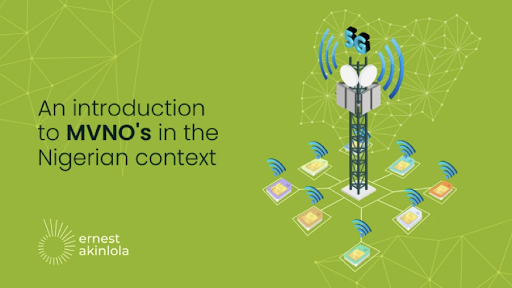This article is a guest submission by Ernest Akinlola, an MVNO expert and the Managing Director of Bboxx.
Although MVNOs (Mobile Virtual Network Operators) are a relatively new concept in Nigeria, it’s likely to become a household term by the end of 2024. An MVNO is a business model where an existing or new brand leases the radio spectrum of an incumbent Mobile Network Operator (MNO) to provide value-added services to customer segments not fully served by the incumbent MNO, e.g., remote rural areas.
MVNOs were not born out of design but of necessity; One2One launched the world’s first MVNO in 2000 when Virgin Management had the idea of running a mobile network without building one. At the time, they had approached the dominant Mobile Network Operators in the market but had been declined due to a lack of strategic fit.
One2One was the fourth entrant at the time—like Etisalat was in Nigeria in 2008—and needed to accelerate its market share and use its national network capacity. Once a network is built, it becomes a sunk cost and needs traffic to generate revenue to cover operational costs. The default strategy is to grow organically and run the network at a loss until it breaks even; it’s similar to an airline flying A380s half-empty across the Atlantic.
With the aspirations of One2One and Virgin Management seemingly aligned, I was tasked with assessing the validity and sustainability of this potential partnership and making a recommendation to the board. Ultimately, we formed a Joint Venture and launched the inaugural and most successful MVNO brand worldwide, spawning the revolution in MVNOs.
The Nigerian Context
MVNOs will be launched in Nigeria later this year under a mandate by the NCC to the MNOs. However, the underlying dynamics in Nigeria differ from the more laissez-faire approach in the UK and the rest of the world. Firstly the Nigerian regulator has mandated five different tiers under which an MVNO can operate.
Secondly, Nigerian MVNOs are mandated to MNOs as more of a push than a pull strategy. In the UK, European and USA context, MVNOs embraced MNOs as a strategic and tactical approach to growing market share, reaching more customers and driving enterprise value.
MNOs in Nigeria now need to re-evaluate their strategic plans, technical readiness, network capacity and human capital to manage a new business concept that may appear to be a logical extension. Still, it is not as simple as that. Along with the perceived benefits of launching an MVNO, inherent challenges must be overcome to run a successful sustainable operation.
It is, therefore, incumbent and imperative on both the MVNO licensee holder and the MNO partner to fully map out expectations and a roadmap to success. This will be explored in more depth in another article. It stands to reason that the higher the tiered license, the more complex and intricate the planning and execution, depending on the MNO’s readiness and integration capabilities.
On the other hand, a tier 1 or 2 licensee may be more of a plug-and-play, but it is inherently more dependent on the MNO and will need a solid voice to ensure good service from the MNO network team. The lower-tiered MVNOs are more closely dependent on the MNO’s efficiencies than the higher-tiered MVNOs.
Irrespective of what level of service is provided, the main objective is to offer more value-added services to customers, push services to rural areas and, most importantly, run a sustainable MVNO business.



















